research at dit
customised r&d innovations for companies around the globe
The research activities at the Deggendorf Institute of Technology are basically directed in three directions. Various interdisciplinary research areas shape the scientific profile of the university. These are "Digital Technologies and their Application“, “Health and Quality of Life“ and “Sustainable Production, Energy Technology and Smart Materials“.
DIT is also considered the inventor of the Technology Campus ecosystem. These are bridges between academic teaching & research and the economy. Currently, 16 DIT research and technology campuses and 1 healthcare campus are scattered like satellites throughout Bavaria. No other college or university in Bavaria has more. In cooperation with small, medium-sized and large companies, we conduct research there in the areas of automation, robotics and additive manufacturing, for example. In materials science and the circular economy, in electric and H2 mobility, in cyber security, optics and sensor technology, in smart regions, artificial intelligence and big data, or even in bionic products and the nursing sciences.
The Centre for Applied Research, headed by the Vice President of Research and Transfer, is where all the threads come together.
research activities
research facilities
Research staff and students in our technology campuses and institutes specialise in particular fields of applied research to develop innovations for collaborating companies. Students have the opportunity to complete research projects, practical semesters or degree theses in these technology campuses.
research opportunities
Find out about your opportunities to research and collaborate with us at the highest level in the ever expanding and exhilarating world of research. View available funding opportunities.
events
Find out more about our research activities through reading research publications and blog posts or attending a research event. We'd love to discuss R&D with you!
research news
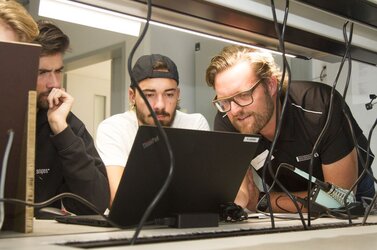
The Deggendorf Institute of Technology (DIT) has been granted the right to award doctorates in the so-called NITRO research area (»Nachhaltige Intelligente Technologien für eine Ressourcenoptimierte Produktion«/sustainable intelligent technologies for resource-optimised production). This was announced by the Bavarian Ministry of Science and the Arts on Tuesday, 16 July. This means that from now on, junior scientists can also do doctorates in this area at the DIT. The first Promotionszentrum ‘Digital Technologies and their Applications (DigiTech)’ was authorized back in October. In both Promotionszentren, the DIT is represented within a network with the Technical University of Applied Sciences Augsburg (THA) and Landshut University of Applied Sciences (HaWL).
Within both Promotionszentren, the DIT has the right to award doctorates. Graduates with a suitable Master's degree in the relevant subject areas are qualified. DIT‘s President Prof. Waldemar Berg reports: „A total of 19 professors ‒ including five from the DIT ‒ are part of NITRO due to their scientific expertise and research strength. They are now authorized to supervise doctorates independently“. Research activities at this Promotionszentrum focus on production systems and processes, product design and materials engineering as well as on technology and innovation. The key topics of sustainability and resource efficiency are an integral part of all focus areas. In particular, the DIT is contributing to the areas of nanotechnology, high-frequency and sensor technologies as well as bionics. „All of these key topics are important foundations for further developing intelligent and resource-efficient technologies and are therefore also indispensable for AI, for instance,“ says Berg.
Prof. Dr. Wolfgang Dorner, Vice President for Research at the DIT, adds: „The aim is for young scientists to conduct interdisciplinary research into new materials, manufacturing processes and methods for environmentally friendly, resource-preserving and economical production and thus to contribute to solving current social, economic and ecological problems“. While 24 doctoral students have already begun their projects within the first Promotionszentrum DigiTech, the first doctoral candidates are expected to be admitted to NITRO towards the end of 2024 or the beginning of 2025. „By establishing the two Promotionszentren, the three Bavarian Universities of Applied Sciences (UAS) are creating perfect conditions for their students‘ academic careers“, Dorner explains. The right to award doctorates at UAS is a logical step towards recognizing the scientific achievements of their researchers and leading excellent students to a doctorate, just like at universities.
As one of the Bavarian UAS which are strongest in research, the DIT can offer young doctoral students an attractive research environment at its many technology campuses. „Doctoral studies at the DIT have a long tradition,“ says DIT President Berg. „A considerable number of young scientists have already been prepared for a career in research and development in Deggendorf and at our technology campuses in the region through cooperative doctorates with universities“. Today, they work in leading positions in research & development departments and in the management of companies or as professors. Berg also adds: „By collaborating with companies, our doctoral students also gain an insight into the importance of research and innovation in an entrepreneurial context and how science, theory and practical relevance interact.“
Today, scientists at the DIT conduct research at 17 technology campuses at twelve locations within the region and beyond. „NITRO will in particular strengthen research at the sites in Deggendorf, Plattling, Hutthurm, Cham, Parsberg, Weißenburg, Freyung, Teisnach and Pfarrkirchen,“ Professor Dorner concludes. This is because research groups and institutes in the fields of materials research, production technology and sustainability research are based there.
Additional information: Doctorate
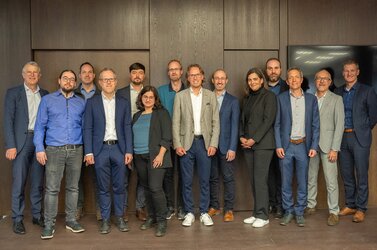
The official opening of the Promotionszentrum DigiTech was celebrated at the Deggendorf Institute of Technology (DIT) on 11 March. Prior to this, in November 2023, the DIT, which had the lead in the application process, was officially granted the right to award doctorates in the field of digital technologies and their application (DigiTech) in cooperation with the Technical University of Applied Sciences Augsburg (THA) and Landshut University of Applied Sciences (HaWL). Master's graduates in the relevant subject areas can now obtain their doctorate at these Universities of Applied Sciences (UAS). Previously, this had been only possible in cooperation with regular universities. DigiTech is the first cross-university alliance in Bavaria to accept doctoral students as early as March 2024.
Two years, a team of ten, eleven faculties, 31 professors with strong research expertise, 51 virtual meetings and 199 pages ‒ this is how Prof. Dr. Roland Zink, Scientific Director of the Graduate School of the DIT, outlines the application process. It was one of the applications that were already approved in the first round and without any additional inspection. The team had developed Doctorate Regulations which embody the highest quality standards for obtaining a doctorate.
The presidents of the three Bavarian UAS ‒ Prof. Dr. Peter Sperber (DIT), Prof. Dr. Dr. h. c. Gordon Thomas Rohrmair (THA) and Prof. Dr. Fritz Pörnbacher (HaWL) ‒ expressed their admiration for the team’s achievements at the opening ceremony. For them, the right to award doctorates is a logical and yet historic step towards recognising the scientific achievements of UAS researchers at the very same level as at regular universities. Prof. Dr. Christian Facchi, Head of the Graduate Center at the TH Ingolstadt and member of the German Science and Humanities Council (Wissenschaftsrat), emphasised in his speech that it is "by no means a second-class doctorate". Rather, it is an opportunity for raising the profile of UAS as teaching and researching institutions with a high level of orientation towards application.
Six doctoral students ‒ two from each UAS ‒ have already embarked on their journey with DigiTech on 1 March. They will be researching in the area of megatrend topics in digitalisation. Prof. Dr. Andreas Kassler, the Steering Committee‘s spokesperson and holder of a Top Professorship (Spitzenprofessur) at the DIT, encouraged them to see their journey ahead as a "springboard for creativity and determination", in which they can always fully rely on the support of the Promotionszentrum DigiTech.
Until the Bavarian Higher Education Innovation Act (BayHIG) was passed in 2022, the awarding of doctorates was the exclusive right of regular universities. Bavaria is the fifth federal state in Germany where it was granted to UAS. The inclusion of the right to award doctorates in the BayHIG was preceded by many years of heated debate between supporters and opponents. Similarly, it was not possible for UAS to conduct any research until 1998. Today, the DIT, the THA and the HaWL are among the strongest research universities in Germany.
Additional information: Promotionszentrum DigiTech
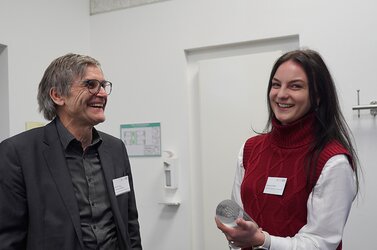
Eight researchers presenting their research projects in only four minutes for each. On the 11th Day of Research, the aim once more was to communicate scientific work such that non-specialists can understand it. The annual event at the Deggendorf Institute of Technology (DIT) was held onsite on 12 March, after having been a pure online event during the past five years.
Conducting research is their main business, but communicating their endeavors and results ‒ to scientists from other disciplines as well as to non-specialists ‒ is something outside of their comfort zone. On the Day of Research, the one presentation which best achieves this aim is traditionally honored with the Best Presentation Award. The three best scientific posters receive Best Poster Awards and bookshop vouchers. Laura Lemberger impressed the audience and especially the expert jury with her concise and fascinating presentation on „The prognostic role of the TSR in PDAC ‒ evaluation of the relationship between the tumor-stroma ratio and the Ki-67 and p53 status in ductal adenocarcinoma“. The glass trophy, which is passed on from winner to winner every year, thus also went to her team under the leadership of Prof. Dr. med. habil. Thiha Aung (DIT), Prof. Dr. Silke Haerteis (University of Regensburg) and Prof. Dr. Christina Hackl (University Hospital Regensburg).
Like in recent years, the posters were designed according to the principle ‘One picture, one caption ‒ research at one glance’. The Best Poster Awards winners were: Nils Rabeneck (TC Hutthurm) with AutoClean, an automated post-processing station for powder-based 3D printing, Mahboubeh Tajmirriahi (TC Vilshofen) with ELISA, an electromobility concept with interoperable and secure architectures, and Lukas Schmidbauer (Health Campus Bad Kötzting) with the topic of cargivers' perceptions of AI.
The other participants also showcased the strength of the research at the DIT with their diverse and fascinating projects: spanning from the Digital Alpine Village, a digitalization concept for a successful, sustainable intermunicipal future in rural Alpine regions (Frank Edenharter) and transcription regulation in malignant melanoma (Zubeir El Ahmad), to projects such as CAIDAN, the AI-supported attribution of cyberattacks in industrial networks (Santhosh Kumar Nataraj) and Greenglass 4. 0, the production of sustainable glass (Andreas Hanninger) as well as C-AFM, approaches for optimization in conductive atomic force microscopy (Jonas Weber). A total of 24 posters were submitted for the 11th Day of Research, which were evaluated by an expert jury of four.
After the presentations, six topic-specific workshops were offered. The aim was to expand networks outside of the DIT and to facilitate knowledge transfer in the form of mutual exchange with partners from professional practice. Andreas Grzemba, who was the Vice President Research and Knowledge Transfer until mid-March 2024, gave the keynote speech. In his presentation, he emphasized how important it is to make research accessible to the general public and to support scientists with formats such as the Day of Research.
Additional information and all posters may be found at Day of Research
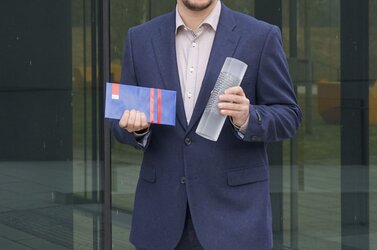
On 23 March, the young researchers from the Deggendorf Institute of Technology (DIT) will once again present themselves to the interested public. At the virtual "Day of Research" between 1 and 3.30 pm, a total of almost 30 researchers will present their scientific projects in short presentations and posters.
"The virtual format has proved very successful for our Research Day," reports Dr Kristin Seffer, Head of Research and Development Services at DIT. In the past, she says, it was particularly difficult for interested companies from further away to fit this date into their tightly packed corporate schedules. "Now everyone can stay at their workstations and easily follow on the computer what exciting research projects there are with us, but also what bright minds are working at the university," says Seffer.
Things get interactive when the best presentation and the three best posters are awarded. Here the auditorium has the choice. For the "Best Presentation Award", the popular challenge cup glass trophy of the Zwiesel Glass School will be awarded again. The complete programme of the Day of Research can be found here: Website. By the way, participation in this event is free of charge. Registration is possible until 22 March 2023.
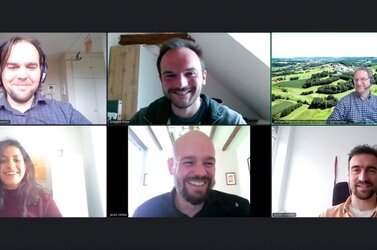
In a new project, researchers at the Deggendorf Institute of Technology (DIT) have been pursuing the idea of equipping charging points for electronic vehicles with multi-functional features and generating added value for users, cities, municipalities and operators. Classic charging stations for electronic cars are now often seen in public areas/ parking lots. They are accessible to everyone. Simply plug in your car, pay and charge or refuel. Theoretically, however, charging points could be equipped with many more functions than just charging. This is being investigated in the project entitled “CrossChargePoint”, which is assigned to the Technology Campus Freyung.
For example, additional energy storage facilities could be created where charging points are installed. This would result in many advantages: Fluctuating demands on the local power grid could be better absorbed. The rapid and simultaneous charging of several electronic vehicles is possible. Or the energy is converted by electrolysis and power-to-gas so that gas- or hydrogen-powered cars can also be refuelled. In the “CrossChargePoint” project, the special requirements of different regions due to different geographical, climatic and economic conditions are taken into account. This and the development of a prototype that should be applicable on a larger scale in the future with only a few adjustments is the main challenge of the project. Ten partners from four different countries have joined forces for the project. Experts from Israel, Austria, Germany and Switzerland, from various companies and research institutes will work together over the next three years to develop this electromobility project. The team from Freyung is responsible for developing the simulation and planning software. For the planning and operation of a CrossChargePoint, conditions are collected and integrated into the simulation and optimisation tool, which specifies the optimal locations, sizes and technologies – such as an energy management system – for new CrossChargePoints by entering the required data. A special focus is also on developing a plan to enable easy energy transfer to other regions with different economic, infrastructural and geographical conditions. For the team at the Technology Campus Freyung, this project led by Professor Dr Javier Valdes offers a great opportunity to advance topics that have already been worked on in the transport and energy sectors in recent years. For this purpose, Professor Dr Wolfgang Dorner, the head of the Technology Campus Freyung has built up a team with extensive experience through the development of projects such as Increase, Cross Energy or e-Road. The project is funded by the Horizon 2020 programme of the European Union.
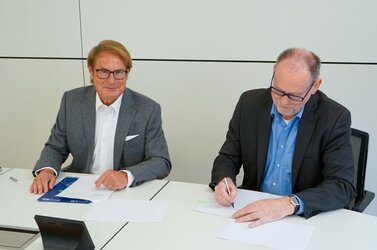
Next year, the Deggendorf Institute of Technology (DIT) will award the “Anton Fink Science Prize for Artificial Intelligence” in the amount of € 10,000 for the first time. This is the highest amount of an award that DIT has presented in the past. As the name suggests, the new “Anton Fink Science Award for Artificial Intelligence” is intended to contribute to strengthening teaching, research and development explicitly in the field of Artificial Intelligence (AI). On 18 May, founder and DIT Honorary Senator Anton Fink made the agreement official with his signature on the cooperation agreement.
As a pioneer in the university landscape when it comes to AI, the DIT can use this award to strengthen, the region in this promising field in parallel to successful initiatives such as the AI Campus Bavaria. Founder Anton Fink has been associated with DIT for many years and would like to see many applications for the science award. The topic of AI fascinates him and he wants to support DIT in a meaningful way. For DIT President Sperber, the advantages are obvious: such a prize will make DIT better known as an institution in the AI scene. In addition, important contacts will be made from which the university will benefit. The prize will be announced for the first time at the end of the year, around October or November 2021. Applications will be accepted from Germany, Austria and the Czech Republic. The jury consists of DIT professors Prof Dr Dr Heribert Popp and Prof Dr Patrick Glauner, DIT President Prof Dr Peter Sperber, from Austria FH Prof DI Dr Stefan Huber, from the Czech Republic Assoc. Prof Ivo Bukovsky, PhD and Minister of Science Bernd Sibler. The award will be presented in spring 2022 and is to be continued annually.
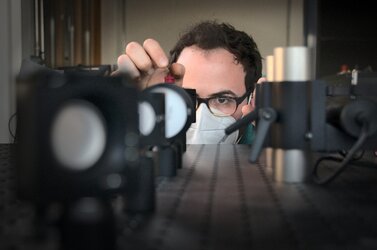
For the past three months, physicists at the Deggendorf Institute of Technology (DIT) have been working on a new generation of spectrometers. Like the human eye, they examine reflected light. However, they surpass the eyes' ability many times over and enable insights into the world that would otherwise remain hidden. The Teisnach researchers' new spectrometers are to be cheaper and more compact. They are currently testing the new method in the laboratory.
Scientists have been working on the measurement of light for centuries. The model is the human eye. The human eye recognises whether a strawberry is red and therefore ripe by the light that is reflected from the strawberry. It is examined by the eye for its components and can distinguish between millions of shades of colour. In science, spectrometers perform this task. Today, it is impossible to imagine the diverse applications of spectrometers without them: doctors use them to find clues to certain pathogens in the air they breathe, biologists measure the oxygen content of rivers and oceans, criminologists examine crime scene evidence, modern combine harvesters measure the nutritional value of grain. And modern astronomy relies almost exclusively on spectrometric investigations because of the inaccessibility of the objects being studied. However, the size and high price of high-precision spectrometers are still a hurdle for many applications. This is where the research work of three physicists from the Deggendorf Institute of Technology comes in. At the Technology Campus in Teisnach, Alois Schneider and Abdul-Hamid Fattah are researching a new method for examining light, for which a patent has been filed by Prof. Dr. Gerald Fütterer. This method enables a number of new technical applications, including the development of more compact and cheaper spectrometers. The scientists expect first results in autumn.
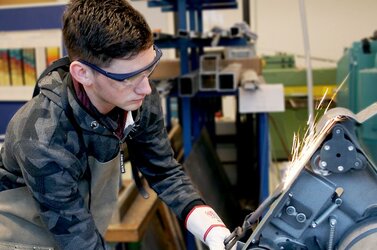
The 8th Day of Research of the Deggendorf Institute of Technology (DIT) will take place on 11 March. Like last year, this time it will also be virtual. Start is at 1 pm. The event ends at 3.30 pm with awarding the three best posters and the best presentation.
Anyone interested in applied research at DIT can take a digital look over the fence for two and a half hours. Whether business, industry, society or even future students, everyone is invited to take part in the Day of Research. Uncomplicated from the office or from home. A total of eleven research topics will be presented. From the areas of sustainable management, innovative materials and energy, intelligent mobility, digital economy and society, as well as innovative working environments and healthy living. Each in three short minutes. After all, the aim of the Day of Research is not so much to delve into the depths of the respective scientific topic, but rather to create the basis for a reciprocal and, if desired, interdisciplinary dialogue. The same applies to the poster exhibition. The posters are designed in such a way that one grasps what they are about at a glance. This makes it possible to enter into a very low-threshold discussion with the young researchers at DIT. The three best posters will be awarded prizes. As in previous years, the trophy for first place was designed by the design class at the Zwiesel Glass College and produced in the educational institution's own manufactory.
Registration for the Day of Research is possible until 10 March via the DIT website: www.th-deg.de/dor-2021. Participation is free of charge.
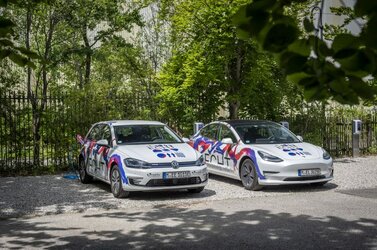
One reason why more companies have not yet fully switched to electric mobility or do not offer charging stations is the concern about significant additional costs in terms of electricity consumption. Companies usually have a contractually agreed annual maximum load. If this is exceeded, depending on the size of the company, surcharges of up to several hundred thousand euros on the unforeseen load peak can be the result. The parking and charging management system “SmiLE” will soon provide a solution to this problem. Scientists at the Deggendorf Institute of Technology (DIT) are developing the system.
Prof Dr Andreas Berl is responsible for the project and knows the explosive nature of the topic. The problem for companies is uncontrolled charging. The feared additional costs caused by peak electricity consumption are quickly reached. A load peak is when the average energy consumption in an interval of 15 minutes exceeds the maximum contractually agreed upon with the electricity provider. There are many reasons why a load peak occurs. According to Prof Berl, this is the case when charging processes are started immediately with maximum power and batteries are unnecessarily “fully” charged. When charging processes are unscheduled, without enquiring about the next use of the vehicle. Or if the charging processes are not coordinated with the rest of the company’s energy system (e.g. load management).
In order to solve these problems, the research group led by Prof Berl is developing the SmiLE parking and charging management system. The goal is to bring more companies to e-mobility. The system is connected to the company’s existing energy system. SmiLE also makes it possible to reserve a parking or charging option so that the e-vehicles are charged according to the reservation details. In addition, a company’s own vehicle fleet can be integrated into the charging management. With the help of AI-supported forecasting methods, the charging processes can be planned in such a way that no expensive peak loads occur. To this end, DIT is developing and implementing algorithms for optimal charge planning and forecasting models. In addition, the charging planning is to be optimised according to the entrepreneurial goals. Exampled of this are the maximum use of renewable energies, the extension of the service life of vehicle batteries and stationary energy storage or the minimisation of charging costs.
To identify the respective requirements, the many years of experience of E-WALD GmbH, one of the largest German charging infrastructure operators, and eeMobility GmbH, which operates charging infrastructure for companies throughout Germany, are of great importance. Seamless communication between the respective system components and in particular the connection between the SmiLE system and the charging stations is the focus of eeMobility GmbH in the project. The SmiLE project (No. AZ-1405-19) is funded by the Bavarian Research Foundation. The project started in May 2020 and ends in 2023.
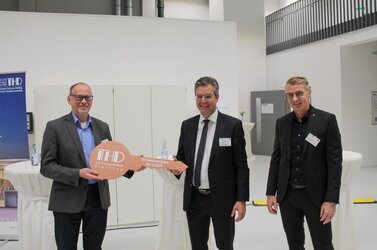
On 6 October the Research Centre for Modern Mobility (MoMo) opened in Plattling. It is the tenth Technology and Research Campus (TC) of the Deggendorf Institute of Technology (DIT). Hans Schmalhofer, First Mayor of the town of Plattling, DIT President Prof Dr Peter Sperber and Science Minister Bernd Sibler welcomed the number of guests, which was limited to 40 due to the pandemic, and highlighted the great development potential for the town of Plattling associated with the MoMo. The TC will be working with an interdisciplinary approach, which includes and combines the fields of energy storage, power electronics, autonomous mobility and robotics as well as robot-based computer tomography.
Even though the establishment of the Technology Transfer Centre for Plattling represents a considerable investment, it is a right and important step for the development of the town, said Mayor Schmalhofer and added, not without pride: “Plattling will become a research location for a university – with a key technology of the future! Indeed, the constellation of a thematically very well coordinated research community together with the scientific competences at DIT is a unique selling point in the field of modern mobility. “This”, according to the operational director of the MoMo, graduate engineer Katrin Juds, “should be a good basis for further research alliances which can additionally strengthen the region economically.” Minister of State Sibler also praised DIT and its role as an important East Bavarian piece in the Bavarian High Tech Agenda. Sibler stressed: “Thinking progress from the region – that is the formula behind the new research centre ‘Modern Mobility’. With its long tradition as a railway town and transport hub, Plattling is an excellent location for working on the mobility of tomorrow. Our universities of applied sciences and technical universities are strong drivers of innovation. It is from here that the future is shaped – for the region, for Lower Bavaria and for Bavaria”.
The close networking with the Deggendorf Campus ensures a broad spectrum of research and development capacities, as with all TCs of DIT. This includes contract research, funded projects, bachelor and master theses or seminars and workshops. At the scientific level, the MoMo is closely linked to its mothership in Deggendorf, for example, in the areas of electromobility, fleet management, virtualisation of resources and services and intelligent energy information network (smart grid). “Promising options for regional structural support in all areas of mobility are associated with the MoMo”, confirmed DIT President Sperber. Otto Kreutzer, head of the Power Electronics Research Group, also sees an ideal composition to enable area-wide climate-neutral mobility one day, hopefully not too far away. “An innovation driver such as the MoMo will help to push the technological status of regional companies forward,” says Kreutzer.
Intelligent mobile robotics will also play an important role at TC Plattling. In this context, division manager Prof Dr-Ing Berthold Bäuml would like to “conduct research at a top international level.” This will be done in close cooperation with the Institute of Robotics of the German Aerospace Centre and the Technical University of Munich. “Through close cooperation with the local companies, we will transfer the research results into concrete applications,” says the professor. The current topics range from the autonomous vertically-launching VTOL drone for the early detection of forest fires and bark beetles, the intelligent robotic assistant in production to the humanoid service robot with arms and hands as a personal assistant for older people.
Computer tomography is a powerful imaging technique for the examination of a wide variety of materials, components and products. In the field of e-mobility, companies are breaking new ground in many respects. Prof Dr-Ing Jochen Hiller, research group leader of robot-based computed tomography, sees a great need for the use of the most modern measuring and testing methods to comply with safety and quality standards. “Due to the extraordinary future viability of 3D imaging in combination with robotics, we see the MoMo as a nucleus for a further campus. But also as an opportunity for company spin-offs,” says Hiller. He added that there is definitely a need for more companies in Germany dealing with imaging processes and intelligent robotics.
The ecumenical blessing of the building was performed by Dean Josef K Geismar and Pastor Karolin Gerleigner. Afterwards, architect Robert Brunner symbolically presented the key to the laboratory hall to the First Mayor of the town of Plattling. He finally places it in the hands of the DIT president as the actual user of the building. The MoMo was thus opened and went straight into working mode. With a guided tour of the research rooms and laboratories for the guests.
Learn more about the MoMo: https://www.th-deg.de/en/tc-plattling.
Info Box Technology Development at MoMo
|
Chemistry and technology of electrochemical energy storage (modern energy storage systems for mobile applications, grid stabilisation through storage solutions, improved battery storage systems, innovative energy storage systems, hybrid solutions for Deutsche Bahn) – Prof Dr techn Michael Sternad |
|
Power electronics (high-performance charging stations in combination with storage solutions, DC/DC conversion in fuel cell systems, smart grid, power electronics in the environment of rail vehicles, etc) – Prof Dr Ing Otto Kreutzer |
|
Solutions for autonomous driving (sensors, algorithms, networking in the vehicle, metrological function validation, … all topics around autonomous systems and autonomous driving) – Prof Thomas Limbrunner |
Info Box Intelligent Autonomous Robotics and Computer-Aided Measurement Technology at MoMo
|
Robot-based computed tomography (3D digitalisation of large objects up to complete vehicles with the help of a robot-based digitalisation cell based on X-ray computed tomography) – Prof Dr Ing Jochen Hiller |
|
Autonomous Intelligent Robots – Joint Research lab with DLR Institute of Robotics (Learning robots that independently perform complex tasks: from humanoid assistance robots for home, production or agriculture to autonomous exploration drones) – Prof Dr Ing Berthold Bäuml |
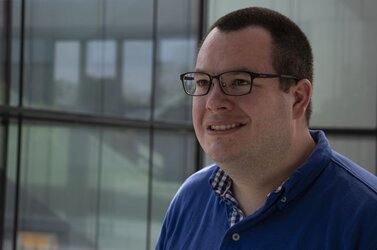
What exactly is Artificial Intelligence, also known as AI? In which way does AI influence our future, in Lower Bavaria, in the Bavarian Forest, or maybe even in Deggendorf. Prof Patrick Glauner from the Deggendorf Institute of Technology (DIT) can tell us more about it.
Scientists found out, primal fears are connected to AI: surveillance, enslavement, loss of uniqueness/exceptionalism, as well as the end of free will. "Exaggerated", that's what Prof Glauner calls it, when you're talking about the end of free will, just because people follow the algorithms through internet or media ads. People will not be replaced by robots in the near future. But somehow, artificial intelligence seems to have escaped from blockbuster movies, like the genie from the bottle. The movies that gave us goosbumpbs: The Matrix, Minority Report or the Fritz Lang classic Metropolis from 1927 - one of the most important pieces in film art history.
"We've been able to use AI for pattern recognition in radiological diagnostics. A great enrichment for our healthcare in oncology," said Glauner, referring to a prime example of beneficial AI developments. In addition to a whole range of other applications already available today, artificial intelligence could certainly one day include all the useful connections between the unmanageable scientific disciplines and make them visible and usable again. The polymath from antiquity no longer exists. What does a virologist even know about AI, what does a computer scientist know about viruses? Certainly not enough. And those who don't know anything must believe everything. The data is here. More than enough, big data in fact. And big data is the food for meaningful AI.
Patrick Glauner has been a professor for artificial intelligence since the age of 30. Previously, he worked at the European Organization for Nuclear Research (CERN) in Geneva and at Krones AG, among others. He has been working on artificial intelligence for ten years, most recently in particular on AI innovation management. In spring 2020 he published a book on this subject in cooperation with the Springer-Verlag: "Innovative Technologies for Market Leadership: Investing in the Future".

